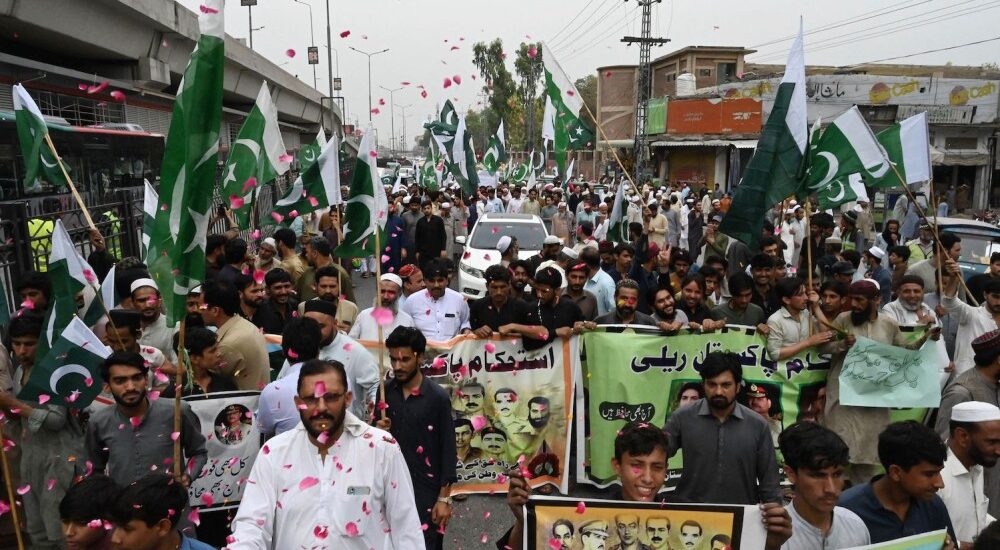Pakistan, With Head Above The Water : Way The Cookie Crumbles
- July 6, 2023
- Posted by: admin
- Category: Uncategorized

Lt Gen Syed Ata Hasnain (Retd)
I am becoming increasingly more confident at answering the inevitable question about Pakistan that is thrown at me in seminars, interviews and interactions on geopolitics. The question revolves around Pakistan’s survivability in the light of all that is happening in that country. I invariably opine that Pakistan will survive at any cost, its weak political and economic status notwithstanding. Voices from within Pakistan also express the same sentiment because over time Pakistan has become a champion survivor. The fissiparous trends within have hit it several times in the past but with time they tend to blow over. Internationally no one wishes to witness the meltdown of a state of 220 million people and a bag full of military wherewithal, including nuclear weapons, carrier vehicles and launch platforms; plus the potential for providing scores of terrorists to fight in alien lands. At the first indication of existential crisis big powers would preferably step in, not to resolve internal conflict but primarily to safeguard the nuclear assets from some potentially very nasty players.
For the last three months we have been hearing of the failing state of Pakistan but somehow it continues to survive, riding on the back of those big powers who have the money and the intent to remain in influence in the area and keep Pakistan’s head above water. Pakistan’s geostrategic location invariably comes to its rescue because instability here would mean its conversion to the happiest hunting ground for future terror movements within Pakistan, all with potential to cascade to trans-national levels. Given its history of internal strife, its territories will always need to be under surveillance.
With its head just above water, what course will Pakistan chart for itself under the current circumstances? That should be everyone’s concern because there is no guarantee that perceptions and interests of those who keep Pakistan afloat match ours in India, or that the arrangement is in any way permanent in nature; after all strategic interests change based upon national interests.
A look at the economy of Pakistan evinces no confidence. As per a media report Pakistan’s economy grew by only 0.29% in FY 22-23. With depleting forex reserves, strict import restrictions that have crippled industry, stalled IMF programs, devastating floods in many parts of the nation and political chaos to boot, this is entirely possible. The Economic Survey for 2022-23 released by the Pakistan Finance Ministry, however states – “Pakistan after realizing 3.4% global growth in 2022, expects growth to slow down to 2.8% in 2023 before rising to 3.0% in 2024.” Besides the chaos in leadership and political environment, it is the credibility of everything that is said in Pakistan which is now becoming a problem.
On governance, the prominent columnist, Eman Tarar writes in Dawn of Jun 09, 2023 “The bureaucracy mainly controlled by military officers operates outside the realm of accountability to elected officials. One cannot help but marvel at the satirical nature of Pakistan’s political landscape whether the country’s supposed leaders are merely figureheads and the military is the true force to be reckoned with”. That has long been the scene in Pakistan. While the failure of democratic institutions in Pakistan is typically attributed to constitutional and judicial weaknesses, it was the lacklustre political leadership, shorn of charisma, and the failure to execute agrarian reforms and social engineering which led to the dominance of the Pakistani Army. With the introduction of extremist ideology into every element of existence in Pakistan, the Pakistan Army actually placed stops on the growth process of the nation towards a more liberal society. Its subsequent progress was artificially supported by liberal doles from the US, but the impressive economic growth of the past and high per capita gains was to remain restricted to a small urban industrial elite; in general Pakistan remained in a time warp for fairly long. Suddenly, appeared Imran Khan who had been making efforts at politically exploiting his celebrity image but had succeeded only marginally.
The Pakistan Army, quite fed up with the inability of the political parties to effectively function under the system stymied by its own domination of the political environment, decided to give Imran Khan a chance; in effect it released a Frankenstein. The ‘selected PM’ tried to dig in by trying to break the Army’s unity and only succeeded in worsening the misgovernance, picking fights with those on Pakistan’s side and generally trying to be his own man. In Pakistan’s turbulent power equations such behaviour is sacrilege. Deposed constitutionally in Apr 2022 Imran Khan has been pushing the envelope for early elections because by some stroke of fortune a perception appears to have been created among Pakistan’s weak civil society that politically he is the best bet. Over the last three months or so, as the economy withers and the terror group Tehreek e Taliban (Pakistan) or TTP rejuvenates with the support of the Afghan Taliban, a political drama has progressively played out resulting in the Pakistan Army under Gen Asim Munir and the Pakistan Democratic Movement or PDM (a coalition of prominent political parties) having a convergence of interests. The weeding out of Imran Khan is a high priority for both.
Imran Khan’s hubris has probably got the better of him as he has been unable to retain his supporters under threat from the Army and the PDM. His fatal mistake was in not anticipating how seriously the military would react to stirring divisions within its ranks. His favourites in the Army such as General Faiz Hameed (now retired) carry almost no weight. Imran Khan is attempting to contact many in the US political community for support but the US is always comfortable dealing with the Pakistan Army and won’t bite.
The one aspect which he has been depending upon has been early elections. These are unlikely in the foreseeable future until the economy sees some northward movement. That gives the Pakistan Army enough time to erode his base even further and reduce PTI to a non-entity. Pervez Khattak, the former chief minister and defence minister, became the latest high-profile resignations from Imran’s PTI. He followed in the path of his former finance minister, his former human rights minister, his former information minister and his former shipping minister, who all stepped down from senior posts or left PTI altogether in recent weeks. Dozens of other federal and state ministers have followed suit. Chaudhry Pervaiz Elahi and Shah Mahmood Qureshi, two of Imran’s senior ministers, have been in jail since May. Sugar baron and Imran Khan’s old friend Jahangir Khan Tareen, who is leading the group of leaders who quit the PTI party in the wake of May 9 attacks on military installations, has just announced the launch of the Istehkam-e-Pakistan Party (IPP) during a press conference in Lahore. The former PM is under pressure to keep his party intact as dozens of top leaders have abandoned it after the crackdown launched to arrest those involved in attacks on military installations on May 9.
There is no longer any doubt that the Pakistan Army is coming back into its own executing what it has always been very good at. What is being enacted is not a ‘Triple One Brigade’ type coup d’etat; it’s a slow and steady erosion of the power of a political personality that the current Pakistan Army leadership wants nothing to do with. In a couple of months General Asim Munir will have a majority of the nine Corps Commanders who have been appointed under his orders. Loyalties will be surer and the power of the Army will exponentially increase as the Chief becomes more secure.
In the evolving scenario the economy is hardly likely to recover and the political scene could get even more turbulent. As per Aqdas Arzal, writing in Dawn of Jun 09, what we are witnessing in Pakistan is a polycrisis. He further states – “appalling economic indicators underscore an urgent need to get a grip on Pakistan’s economic slide, especially as almost 2 million young people, who enter the job market every year, either face unemployment or are underemployed and are forced to take up jobs that are inadequate in relation to their training and economic needs. According to the Asian Development Bank, given Pakistan’s employment elasticity at 0.5%, it would take economic growth of at least 7% to create a sufficient number of jobs”. That possibility does not seem anywhere on the cards.
In all probability Pakistan will amble along at the same pace with hardly any major initiatives. As the economic situation probably worsens or fails to recover, societal tension will only enhance and the political environment will also get more tense. Limited bailouts by Saudi Arabia, UAE and the US have been made recently and some are on the cards from China. From all indicators Pakistan’s head will yet remain above water but if a flood is created by political turbulence, societal upheaval or economic crisis, it will drown in a self-created cesspool of subterfuge, deceit and mismanagement.


Lt Gen Syed Ata Hasnain (Retd)
AUTHOR
Lt Gen Syed Ata Hasnain (Retd), PVSM, UYSM, AVSM, SM, VSM* former Commander of Indian Army’s Srinagar Corps, focuses on trans-national and internal conflicts in Asia and the Middle East with particular emphasis on issues revolving around radical Islam. He is the Chancellor of Central University of Kashmir and speaks extensively at Indian and international institutions on a wide variety of subjects revolving around strategic affairs and leadership. He is presently a Member of the National Disaster Management Authority (NDMA).
